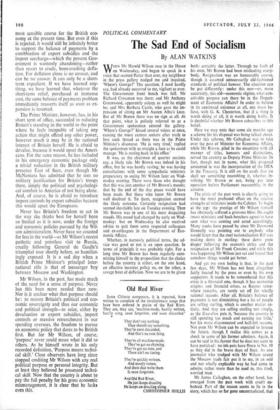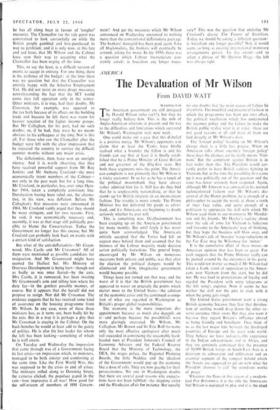The Sad End of Socialism
POLITICAL COMMENTARY
By ALAN WATKINS
WHEN Mr Harold Wilson rose in the House on Wednesday, and began to speak in a voice that seemed flatter than ever, my neighbour in the press gallery nudged me and inquired, 'Where's George?' The question, I need hardly say, had already occurred to me, vigilant as ever. The Government front bench was full. Mr Richard Crossman was there; and Mr Anthony Greenwood, apparently asleep, as well he might be; and Mrs Barbara Castle, who gave the im- pression of sitting on Mr Austen Albu's knee. But of Mr Brown there was no sign at all. At that point, what is politely referred to as a Government spokesman entered the gallery. 'Where's George?' hissed several voices at once, causing the more earnest seekers after truth to lose such thread as there was in the Prime Minister's discourse. 'He is very tired,' replied the spokesman with as straight a face as he could manage. 'He is resting back in his office.'
It was, as the chairmen of quarter sessions say, a likely tale. Mr Brown was indeed in his office, but he was hardly resting; he was having consultations with some sympathetic ministers preparatory to seeing Mr Wilson later on Wed- nesday evening. There were those who thought that this was just another of Mr Brown's moods; that by the end of the day peace would have been made. But those who knew Mr Brown well doubted it. To them, resignation seemed the likely outcome. Certainly resignation had seemed inevitable late on Tuesday evening. Then Mr Brown was in one of his most despairing moods. His mood had changed by early on Wed- nesday: but on Wednesday he also received advice to quit from some respected colleagues and ex-colleagues in the Department of Eco- nomic Affairs.
Whether, in narrowly political terms, the ad- vice was good or not is an open question. In terms of principle it was probably right. For a long time Mr Brown has been regularly com- mitting himself to the proposition that the choice before the country is either, on the one hand, an effective incomes policy or, on the other, a savage bout of deflation. Now we are to be given both; certainly the latter. Through no fault of his own, Mr Brown had been misleading every- body. Resignation was an honourable course, though it assumed unnecessarily old-fashioned standards of political honour. The situation can be put differently: under this new—or, more accurately, this old—economic regime, what con- ceivable purpose can there be in the Depart- ment of Economic Affairs? In order to believe in its continued existence at all, one must be- lieve, with G. K. Chesterton, that if a thing is worth doing at all, it is worth doing badly. It is doubtful whether Mr Brown subscribes to this belief.
Here we may note that some six months ago a scheme for his disposal was being talked about. Under this scheme, Mr Callaghan was to take over the post of Minister for Economic Affairs, while Mr Brown, piled in the meantime with all manner of titles, honours and distinctions, served the country as Deputy Prime Minister. In fact, though not in name, what this proposal amounted to was the incorporation of the DEA in the Treasury. It is still on the cards that we shall see something resembling it, whether in- volving Mr Brown or not, being put into operation before Parliament reassembles in the autumn.
The crisis of the past week is clearly going to have the most profound effect on the relative strengths of ministers inside the Cabinet. To begin at the top: the prestige of Mr Wilson himself has obviously suffered a grievous blow. He ought (most ministers and back-benchers agree) to have seen what was coming and acted accordingly. Many weeks have passed by since Mr Desmond Donnelly was pointing out to anybody who would listen that the steel nationalisation Bill was making dents in sterling; these dents grew deeper follow ing the seamen's strike and the resignation of Mr Frank Cousins; and while this was happening Mr Wilson just sat and hoped that somehow things would get better.
And yet my own feeling is that, in the past few days, Mr Wilson has not been altogether fairly treated by the press or even by his own supporters. It needs to be remembered that this crisis is a financial one, though it has economic origins; and financial crises, as Keynes some- where remarks, are rarely set off for wholly rational reasons. After all, Britain's balance of payments is not diminishing but a lot of people are selling sterling, which is another matter en- tirely. And they are selling sterling not simply, as the Guardian puts it, 'because the country is still spending too much and earning too little,' but for more disconnected and half-felt reasons. Not even Mr Wilson can be expected to foresee the future, though I realise this comes as a shock to some of his former admirers. Again, it can be said in his favour that he does not seem to have panicked : no ink-pots have flown in No. 10 as they did in the brave days of Suez. As one journalist who trudged with Mr Wilson round the Moscow trade fair put it to me, in an odd and not wholly explicable way he had come to admire, rather more than he used to, this tired, worried man.
Mr James Callaghan, on the other hand, has emerged from the past week with credit en- hanced. Part of the reason seems to lie in the story, which has so far gone =contradicted, that
he has all along been in favour of `tougher' measures. The Chancellor (so the tale goes) was constrained to look sorrowfully on while the British people gambled and hire-purchased its way to perdition; and it is only now, at this late and sad hour, that Mr Wilson and the Cabinet have seen their way to accepting what the Chancellor has been urging all the time.
This, to say the least, is a difficult version of events to accept in entirety. For one thing, there is the evidence of the budget: at the time there was no question but that the Chancellor was entirely happy with the Selective Employment Tax. He did not insist on more direct measures, notwithstanding the fact that the SET would come into full operation only in the winter. Other ministers, it is true, had their doubts. Mr Crossman, for example, was opposed to the tax both because of its effects on the building trade and because he felt there was room for heavier taxation of the higher income groups. But Mr Callaghan, for his part, had no such doubts; or, if he had, they were by no means obvious to his colleagues at the time. Nor is this all. For those who saw the Chancellor after the budget were left with the clear impression that he expected the country to survive the difficult summer months without any major crisis.
The deflationists, then, have won an outright victory. And it is worth observing that they have received powerful support from Mr Roy Jenkins and Mr Anthony Crosland—the most economically intent members of the Cabinet— not only in the past week but for a long time. Mr Crosland, in particular, has, ever since Octo- ber 1964, taken a completely consistent line. Devaluation having been ruled out, the alterna- tive, in his view, was deflation. Before Mr Callaghan's first measures were announced in 1964, Mr Crosland vainly urged that they should be more stringent, and for two reasons. First, he said, it was economically necessary and, secondly, it was at that stage still politically pos- sible to blame the Conservatives. Today the Government no longer has this excuse, but Mr Crosland can probably look back on events with a certain kind of satisfaction.
But what of the anti-deflationists—Mr Green- wood, Mrs Castle and Mr Crossman? All of them were mentioned as possible candidates for resignation. And Mr Greenwood might have seemed the likeliest bet. His Ministry of Overseas Development is being hurt—though not as badly as was once feared—by the cuts. Mrs Castle, it is rumoured, has been twisting Mr Greenwood's arm and telling him where his duty lay—in the gentlest possible manner, of course. But it appears that she herself did not propose to resign. Nor did Mr Crossman. The evidence suggests that he has received some kind of assurance on the housing programme from Mr Wilson. In any case, none of these three ministers has, as it turns out, been badly hit by the cuts. But in a way it is perhaps a pity that Mr Crossman is staying in the Cabinet. On the back-benches he would at least add to the gaiety of politics. He is also the lost leader for whom the left has been looking—something of which he is well aware.
On Tuesday and Wednesday the impression that came through was of a Government facing its last crisis—an impression which, to ministers, managed to be both sinister and comforting at the same time. Like the First World War, this was supposed to be the crisis to end all crises. The ministers rolled along to Downing Street, the cameras clicked, the populace gaped in the rain—how impressive it all was! How good for the self-esteem of members of HM Govern-
ment! And yet the measures which Mr Wilson announced on Wednesday amounted to nothing more than the conventional deflationary package. The bankers' danegeld has been paid again. Like all blackmailers, the bankers will eventually be around, asking for more. In the 1950s there was a question which Labour theoreticians con- stantly asked: is Socialism any longer neces-
sary? This was the question that underlay Mr Crosland's classic The Future of Socialism. Today we should be asking a different question: is Socialism any longer possible? Not, it would seem. so long as existing international monetary arrangements persist. To this extent—and to adapt a phrase of Mr Quintin Hogg—the left was always right.







































 Previous page
Previous page